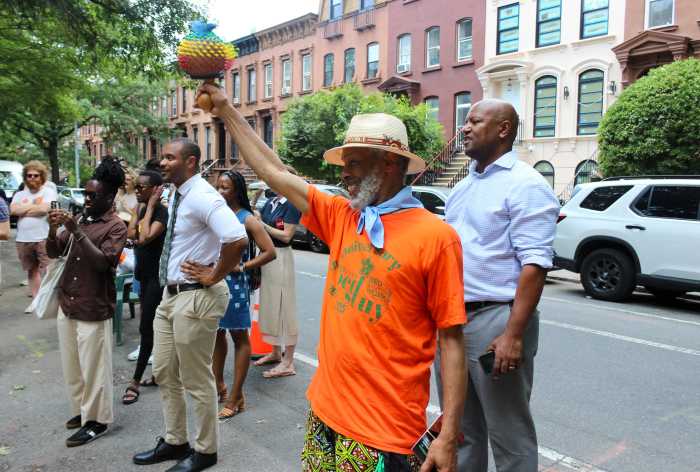The city has banned one of Brooklyn’s largest animal foster groups from saving dogs and cats from euthanasia in city shelters, sparking an outcry among animal lovers from Park Slope to Williamsburg.
The Park Slope–based Brooklyn Animal Foster Network, which has rescued more than 1,000 dogs and cats in its two years, was banned in November because “there were numerous complaints,” said Charlene Pedrolie, the new head of the Center for Animal Care and Control, which put down 15,768 cats and dogs last year.
Pedrolie refused to elaborate.
The result of the ban is “the needless euthanasia of adoptable animals,” said Network Executive Director Laurie Bleier, whose group was one of 150 that work with the Center for Animal Care and Control to get animals adopted. More groups, not fewer, are needed if the city has any hope of cutting back on the still-high euthanasia rates, animal advocates said.
Bleier, who has been rescuing animals for more than 20 years, is a frequent sight in Park Slope, showing pups and pusses on the corner of Seventh Avenue and Fourth Street.
That’s where Tracey Davidson found her tan-and-white pit-bull-mix named Maxx last September.
“I was grieving that week, and I was walking along a little aimlessly,” said Davidson. “I just bent down to say hi to this emaciated dog with the cutest face I’d ever seen and then he just put his head on my knee and rolled onto his back.”
And so she adopted him, and claims the dog has done more for her well-being than she has for his.
Bleier assisted her with veterinary bills, Davidson said.
“She’s obviously in love with animals, dogs and cats alike, and wants to help them,” said Davidson.
Before her animal rescue banishment, Bleier even revamped the CACC Web site for free.
“Laurie was instrumental in providing technical know-how and information to improve our Web site and was the impetus behind the ad campaign,” conceded Richard Richard Gentles, a spokesman for the agency, mentioning Bleier’s role in the “Sheltered animals didn’t do anything” campaign, which featured mug-shots of dogs and cats.
Approved groups that work with the CACC are allowed to charge $200 to adopt a dog, and $100 to adopt a cat — money that subsidizes the care of animals who are rescued from backyards and city streets.
“[Now] we won’t be able to function,” said Bleier.
But some of Bleier’s critics say that’s for the best.
“Ms. Bleier is well known to be a tireless animal rescuer and advocate for several years now — however, she is a very difficult, if not impossible, person to collaborate with,” Garo Alexanian, of Companion Animal Network, wrote in a widely circulated e-mail that defended the city ban.
A woman who adopted a dog from Bleier said that at first, Bleier was helpful. But when the woman revealed that she was looking for a new home for the dog, Bleier got “hostile and verbally abusive.”
Other Brooklynites interviewed for this article expressed support for Bleier.
“I wish we had 20 more like her out there,” said Bob Ipcar, of FIDO, a Prospect Park dog group.
State Sen. Eric Adams (D–Park Slope), who co-hosted an animal adoption event with Bleier in JJ Byrne Park last summer, was similarly supportive.
“People call me bizarre because I love animals, but she superceded me in her passion,” said Adams. “There seems to be a reluctance by the city to explain if she did anything wrong at all.”
Difficult personalities come with the animal-rescue territory, said animal lovers.
“Every rescue group has horns in some form or another,” said Laura Bonavio, a rescuer who has worked with Bleier. “There may be bad things associated with Bleier, but I can’t help thinking about the dogs that are dying because she is no longer able to help them.”
Former CACC head Ed Boks, who now heads up its Los Angeles counterpart, said it is important for agencies like his to work with the sometimes-ornery animal rescue community — not fight with it.
“It really does take a community to care for all the lost and homeless animals,” said Boks.
“Whenever you see an us-versus-them dynamic developing, it can be very problematic — and the ones who suffer are the animals.
























